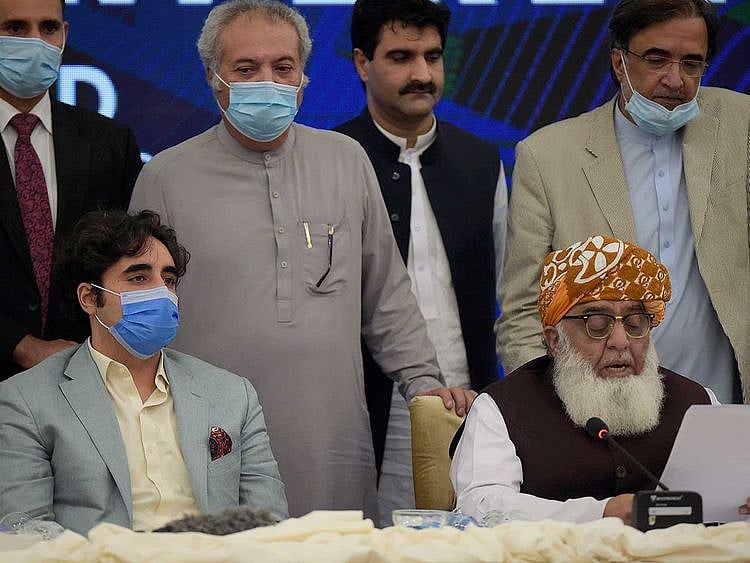Pakistan opposition demands Prime Minister Imran Khan’s resignation
Government urges opposition parties to put Pakistan’s interest first

Also In This Package
Photos: Schools reopen in parts of India after 6 months
Photos: Stand Up Paddle Surfing festival in Moscow
China's rich seek bodyguards trained in digital arts
Race to rescue animals as Brazilian wetlands burn
Photos: Slimy snail facials not for the faint-hearted
Photos: Plant hunters race to collect rare species
Islamabad: Pakistan’s top ministers on Monday urged the opposition leaders to put the interests of the country first and refrain from defaming national institutions. The ministers stated this at a press conference a day after the country’s major opposition parties launched an anti-government drive under the banner of the Pakistan Democratic Movement (PDM).
“It is not good for the country, it is not in Pakistan’s interest” Foreign Minister Shah Mahmood Qureshi said, insisting that the opposition should not “drag national institutions into politics.” His comments came in response to PML-N supremo Nawaz Sharif’s allegations that there was “a state above the state in the country” adding that the opposition’s struggle was not against Prime Minister Imran Khan but those who brought him into power.
Also Read
See how Pakistani celebrities made the most of the Eid Al Adha weekend Meet Ushna Shah: Pakistan’s answer to Kangana RanautPictures: Pakistan stock exchange in Karachi attacked by gunmen Photos: Pakistan resumes polio campaign after coronavirus pauseOpposition forms coalition to oust PM Khan and his government
Pakistani opposition parties have demanded immediate resignation of PM Imran Khan as they announced a plan of action to oust the current government during a multiparty conference in Islamabad on Sunday. Key opposition parties - Pakistan Muslim League-Nawaz (PML-N), Pakistan People’s Party (PPP) and Jamiat Ulema-e-Islam-Fazal (JUI-F) - formed an alliance and announced three-phased anti-government campaign to overthrow Khan’s government and hold new elections citing “alleged rigging” in the July 2018 general elections.
In the PPP-hosted All Parties Conference (APC), the opposition announced countrywide meetings, protests and rallies in December and a “long march towards Islamabad” in January 2021. The details of the action plan were shared by JUI-F chief Maulana Fazlur Rahman in the presence of PML-N president Shahbaz Sharif and vice-president Maryam Nawaz, and PPP chairman Bilawal Bhutto-Zardari. Former three-time premier Nawaz Sharif and former president Asif Ali Zardari addressed the conference virtually. Both Sharif and Zardari of PPP are facing corruption charges in the court.
Inflation, unemployment and taxes
Imran Khan-led PTI came into power in 2018, transforming Pakistan’s dynastic political structure, with the promise to hold corrupt politicians accountable, create jobs and fix the country’s troubled economy. However, the opposition claims the government has made the life of a common man difficult through “inflation, unemployment and taxes” voicing concerns that “crumbling economy is posing a serious danger to the country”. In a 26-point resolution, the APC also expressed concerns over “rising interference of establishment in political matters” and demanded to “cease this interference”.
“Flimsy attempt” to retreat from accountability
Reacting to the opposition conference, Information Minister Shibli Faraz said that a “peaceful protest is opposition’s right,” but the government would “not allow any violation of law.” He added that the conference was “a flimsy attempt” to put pressure on the government “to back off on accountability” as the opposition “has used politics for personal gains.” Most Pakistan Tehreek-e-Insaf (PTI) leaders and federal ministers termed the opposition demands a desperate attempt to get power-sharing concession or National Reconciliation Ordinance (NRO), seeking parliamentary approval for amnesty from graft and other charges.
“War against state institutions”
Planning Minister Asad Umar accused the opposition of “doing politics” and “blackmailing” on legislation related to the Financial Action Task Force (FATF) to obtain an NRO-like concession when the FATF had “nothing to do with a political party… but essential to keep the country out of the FATF blacklist”. The opposition, he said, has unfortunately waged war against state institutions, including the military, judiciary, and National Accountability Bureau to protect its corruption and properties. Asad Umar said that democratic system is fully functional in Pakistan where the civilian and military leadership is collectively working for country’s development.
Army not associate with political activity
On Monday, PM Imran Khan held a meeting with Army Chief General Qamar Bajwa to discuss internal and regional security as well as the Line of Control (LoC) situation on the border. Pakistan’s military leadership has stressed that army is not associated with any political activity in the country.
Sign up for the Daily Briefing
Get the latest news and updates straight to your inbox
Network Links
GN StoreDownload our app
© Al Nisr Publishing LLC 2026. All rights reserved.